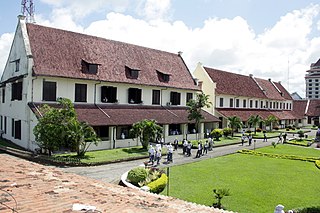Related Research Articles

Banana chips are deep-fried or dried, generally crispy slices of bananas. They are usually made from firmer, starchier banana varieties like the Saba and Nendran cultivars. They can be sweet or savory, and can be covered with sugar, honey, salt, or various spices.

Makassar, formerly Ujung Pandang, is the capital of the Indonesian province of South Sulawesi. It is the largest city in the region of Eastern Indonesia and the country's fifth-largest urban center after Jakarta, Surabaya, Medan, and Bandung. The city is located on the southwest coast of the island of Sulawesi, facing the Makassar Strait.
Curaçao is a liqueur flavored with the dried peel of the bitter orange laraha, a citrus fruit grown on the Dutch island of Curaçao.

Kue is an Indonesian bite-sized snack or dessert food. Kue is a fairly broad term in Indonesian to describe a wide variety of snacks including cakes, cookies, fritters, pies, scones, and patisserie. Kue are made from a variety of ingredients in various forms; some are steamed, fried or baked. Kue are popular snacks in Indonesia, which has the largest variety of kue. Because of the countries' historical colonial ties, Koeé (kue) is also popular in the Netherlands.

Gros Michel, often translated and known as "Big Mike", is an export cultivar of banana and was, until the 1950s, the main variety grown. The physical properties of the Gros Michel make it an excellent export produce; its thick peel makes it resilient to bruising during transport and the dense bunches that it grows in make it easy to ship.

A shooter, or shot, is a small serving of spirits or a mixed drink, typically consumed quickly, often in a single gulp. It is common to serve a shooter as a "side" to a larger drink.
Crème de banane is a sweet, banana-flavored liqueur, usually bottled at 17–25% ABV. It is mostly used in alcoholic drinks but also in cooking; it is an ingredient of various cocktails and desserts.

A banana fritter is a fritter made by deep frying battered banana or plantain in hot oil. It is a common dish across Southeast Asia and South India.
Lucas Bols N.V. is a Dutch public company in the business of production, distribution, sales and marketing of alcoholic beverages. It claims to be the oldest distillery brand in the world. Its brand portfolio consists of Bols, Galliano, Vaccari, Pisang Ambon, Gold Strike and a large group of Dutch genevers and liqueurs. It produces about 3 million cases a year, with yearly revenues exceeding 95 million euros.

Bols is a brand name used by Lucas Bols, a Dutch distiller of alcoholic beverages. The brand line currently consists of vodkas, gins, genevers and liqueurs. Bols has been extant since 1575, and claims to be the oldest distillery brand in the world. The brand is now distributed in 110 countries, and the liqueur line has over 30 different flavors. As the result of an earlier divestiture, in Eastern Europe the Bols brand is owned by Maspex.

Saba banana, is a triploid hybrid (ABB) banana cultivar originating from the Philippines. It is primarily a cooking banana, though it can also be eaten raw. It is one of the most important banana varieties in Philippine cuisine. It is also sometimes known as the "cardaba banana", though the latter name is more correctly applied to the cardava, a very similar cultivar also classified within the saba subgroup.

Pterocaesio pisang, the banana fusilier or ruddy fusilier, is a species of marine ray-finned fish, a fusilier belonging to the family Caesionidae. It is widespread around reefs in the Indo-West Pacific region.

Lumpia are various types of spring rolls commonly found in Indonesia and the Philippines. Lumpia are made of thin paper-like or crepe-like pastry skin called "lumpia wrapper" enveloping savory or sweet fillings. It is often served as an appetizer or snack, and might be served deep-fried or fresh (unfried). Lumpia are Indonesian and Filipino adaptations of the Fujianese rùnbǐng and Teochew popiah, usually consumed during Qingming Festival.

Kripik or keripik are Indonesian chips or crisps, bite-size snack crackers that can be savoury or sweet. They are made from various dried fruits, tubers, vegetables, and fish that have undergone a deep frying process in hot vegetable oil. They can be lightly seasoned with salt, or spiced with chili powder and sugar.
Masak Hijau bananas are triploid banana cultivars from Malaysia. It is a member of the commercially important Cavendish banana subgroup. It is a popular banana cultivar in Southeast Asia and the West Indies.

Makassarese cuisine is the cuisine of Makassarese people of Makassar in the South Sulawesi province of Indonesia.

Kue leker is a type of Indonesian crepe, made with wheat flour, eggs, milk and sugar.

Pisang cokelat or sometimes colloquially abbreviated as piscok, is an Indonesian sweet snack made of slices of banana with melted chocolate or chocolate syrup, wrapped inside thin crepe-like pastry skin and being deep fried. Pisang cokelat is often simply described as "choco banana spring rolls". It is often regarded as a hybrid between another Indonesian favourites; pisang goreng and lumpia.
References
- ↑ "Lucas Bols". Archived from the original on 3 March 2016. Retrieved 30 August 2007.
- ↑ Adi, Yohanes (25 August 2021). "Terungkap Asal-usul Pisang Ambon, Ternyata Bukan Berasal dari Ambon". Paragram.id (in Indonesian). Retrieved 9 December 2021.